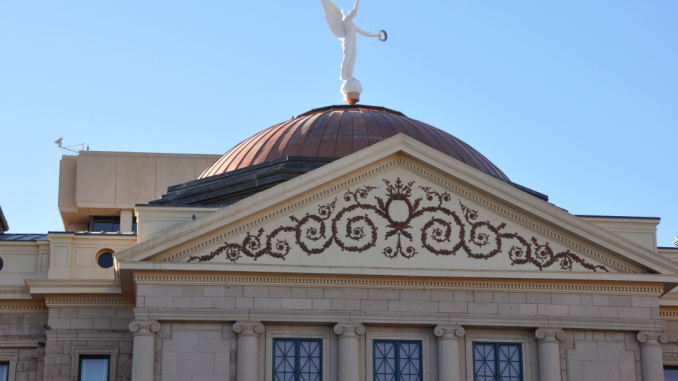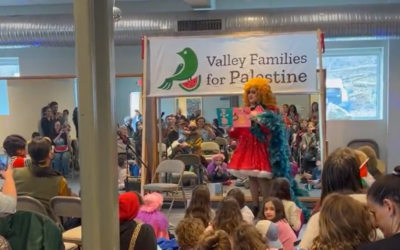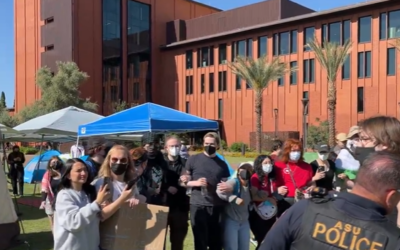By Corinne Murdock |
On Tuesday, House lawmakers convened to discuss the impact of universal school choice in the state.
The House Ad Hoc Study Committee on Empowerment Scholarship Accounts (ESA) Governance and Oversight heard public comments and expert testimony from Alan Maguire, a consultant with the Maguire Company; Patrick Moran, a Joint Legislative Budget Committee (JLBC) staffer; and John Ward, executive director of the ESA Program at the Arizona Department of Education (ADE).
Maguire said that ESA recipient growth has slowed as the school year has gone on, which he said was typical. He expressed the expectation that almost no matter what happens, the ESA Program’s implications for the state budget would be significant but manageable.
“I don’t think [the changes] we’re facing as a result of changes in the ESA recipients will be that challenging; challenging, but not scary challenging,” said Maguire.
Moran, the JLBC staffer, addressed the K-12 financing issues related to student movement between district and charter schools and the ESA Program. The Arizona Department of Education has $11.8 billion, but public schools receive funds from the Basic State Aid (BSA) Formula, which has $9.7 billion.
The BSA Formula factors funding based on average daily membership (ADM) student counts: enrollment of full-time/fractional students for the first 100 days, minus withdrawals, wherein students must meet the minimum requirements for total instructional hours/courses to be counted. The unweighted student count for the 2024 fiscal year was about 1.1 million.
Then, the ADM is weighted based on several grouped statutory factors: Group A weights adjust for school size, location (whether urban or rural), and type (K-8 or high school); Group B weights adjust for specific student populations, such as special education, English learners, or K-3 reading programs. With these group weightings, the 2024 fiscal year count reached about 1.56 million.
The BSA Formula components within the enacted budget established a base funding level of $7.8 billion, additional assistance at $1.04 billion, and transportation at $213 million. Property taxes fund nearly $2.6 billion of the public school formula, which the state partially offsets with a homeowner’s rebate (50 percent in the 2024 fiscal year with a cap of $600).
The enacted budget projected that the ESA Program would cost $625 million for 68,000 enrollees. However, actual enrollment is currently at about 70,000, and the ADE reported that awards have reached $665 million — $40 million over what was assumed in the budget. Moran said that this didn’t necessarily qualify as a shortfall for the ADE because they lack the data on where those new ESA students hailed from.
“We can’t determine the impact of ‘switchers’ in real time, because we don’t know of those 70,000 how many were in public school in FY 2024 and FY 2023,” said Moran. “We also need to know how much formula funding those students were generating in the district or charter school they were previously attending to calculate that net impact.”
Moran said that the average student award was lower from the ESA Program than for public district schools.
“Based on the data that ADE has shared with us, we think the average ESA [award] across all populations original and universal would be about $9,700 [per student], so it would be lower than the $12,200 [for charter schools] and lower than the $14,000 figure [for districts],” said Moran.
State Rep. Judy Schweibert (D-LD02) stated that Arizona ranked 48th in the nation for public school funding, based on federal data. House Speaker Ben Toma (R-LD22), the committee chairman, rebutted that the federal rank may not be entirely accurate, arguing each state’s funding formula for schools was unique and therefore not an apples to apples comparison.
Ward with the ADE offered management and administration updates concerning the ESA Program. Ward reported that the program has grown to nearly 70,200 students from over 13,400 students last September just prior to universalization. He projected that the ESA Program may reach anywhere from 90,000 to 100,000 students by the beginning of the next school year.
Ward projected that ESA awards may reach about $780 million by the end of the 2024 fiscal year. He dismissed concerns that the awards would bankrupt the state, reporting that even at that total the program would have a $57 million surplus in BSA.
Ward touched back on Moran’s assessment that public school student allocations were higher than ESA student allocations: $13,400 for public school students in the 2022 fiscal year versus $9,800 for ESA students in the 2024 fiscal year.
He reported that of the over 15,000 applications reviewed, several thousand were dismissed as incomplete. Additionally, almost 2,200 ESA accounts were suspended because of records indicating they were still enrolled in public school; their annual awards totaled over $21 million.
The ADE will be automating some of its processes going forward concerning purchase approvals and enrollment. ADE has partnered with ClassWallet to curate the catalogs of vendors on the marketplace and establish a rules engine, as well as to deploy directpay, reimbursement, and debit card auto approval through scanning technology and another rules engine.
Additionally, the ADE plans to improve data transparency by publishing a data dashboard. Types of data will include the number of ESA participants by eligibility type, grade level, gender, age, zip code, and county; number of students previously in a public school; number of applications coming in weekly and monthly; and average and median award amounts.
State Rep. Nancy Gutierrez (D-LD18) asked whether the surge in ESA Program popularity had to do with private school families. Moran said that 40 percent of ESA students came from public schools this fiscal year (2024), an increase from the last fiscal year (2023) prior to universalization.
Corinne Murdock is a reporter for AZ Free News. Follow her latest on Twitter, or email tips to corinne@azfreenews.com.








